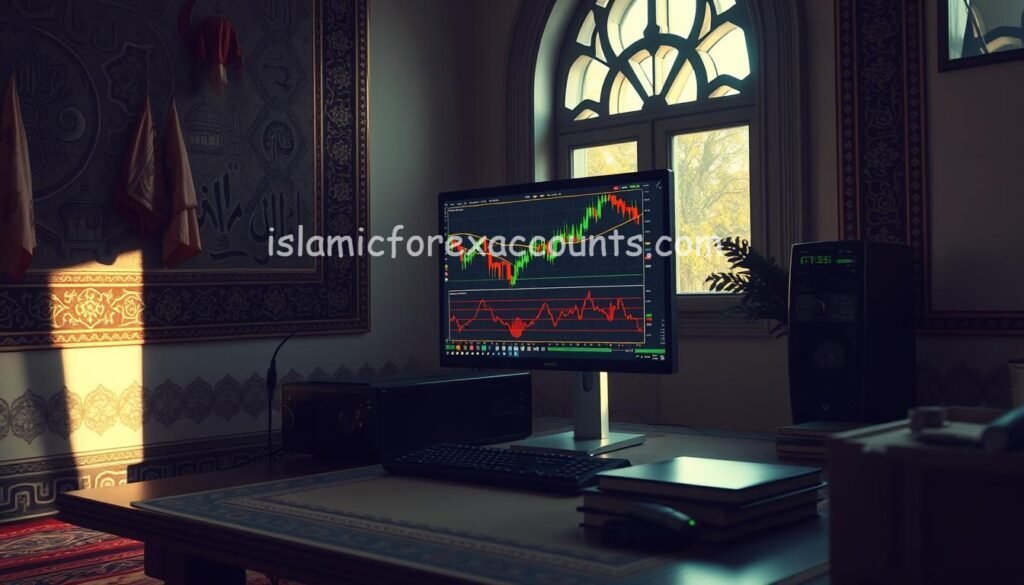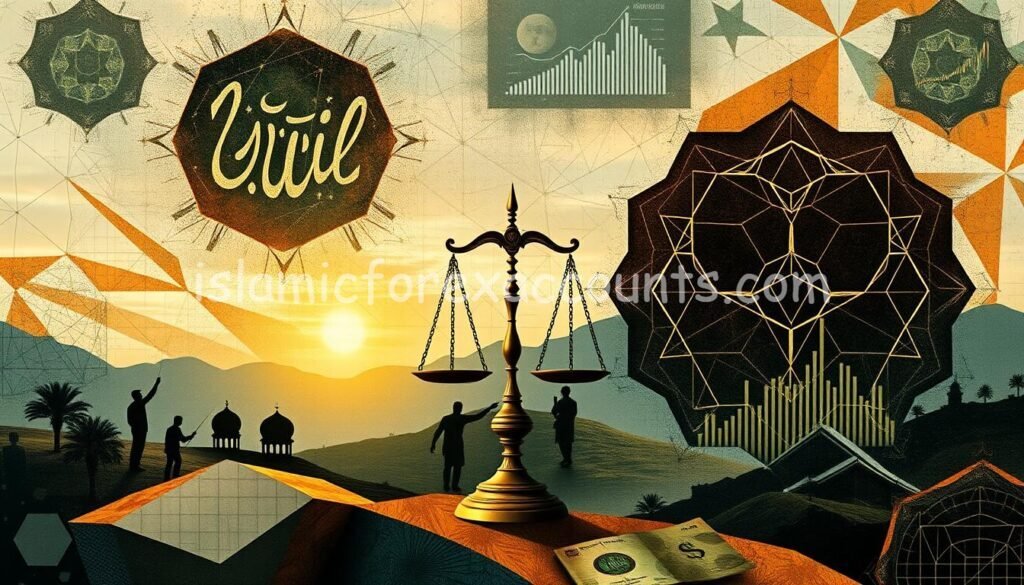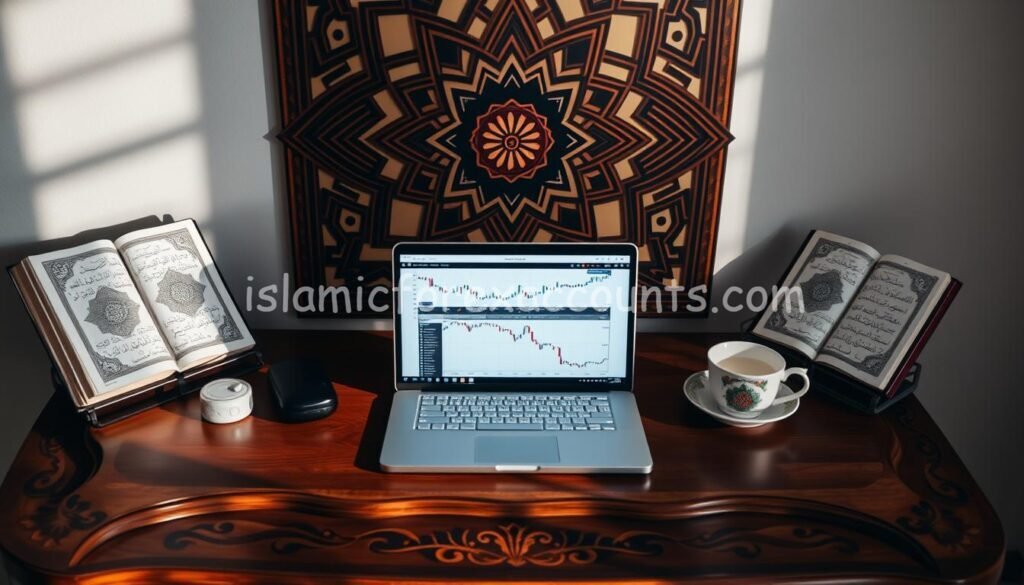Is Forex Trading Halal or Haram? Islamic Guide
In the fast-paced world of finance, forex trading has become popular in Kenya. But for Muslim investors, knowing if it’s okay (halal) or not okay (haram) is key. This guide will look into Islamic rules about forex trading. It aims to help Muslim investors in Kenya make choices that fit their faith.
Key Takeaways
- Forex trading is a complex financial activity, and its Islamic permissibility is a subject of debate among Islamic scholars.
- The key considerations in determining the halal or haram status of forex trading include the absence of riba (interest), speculation, and other prohibited practices.
- Shariah-compliant forex trading strategies and risk management techniques can help Muslim investors engage in the forex market while adhering to Islamic principles.
- Seeking guidance from Islamic scholars and financial experts is crucial for Muslim investors to navigate the complexities of forex trading and ensure their activities are in line with Shariah law.
- Integrating Islamic values, such as ethical conduct and risk management, into forex trading can lead to a more mindful and disciplined approach to investing.
Understanding Forex Trading
Forex trading, also known as the foreign exchange market, is a global market for trading currencies. It’s the biggest and most liquid financial market, with over $6.6 trillion traded daily. Traders aim to profit from changes in currency prices by exchanging one for another.
What is Forex Trading?
Forex trading means buying and selling currencies to make a profit. Traders bet on the strength or weakness of one currency against another, known as currency pairs. The most traded pairs include the U.S. dollar, Euro, Japanese yen, British pound, and Swiss franc.
How Does Forex Trading Work?
Traders in the forex market buy and sell currencies to profit from rate changes. They use tools like technical and fundamental analysis, and leverage, to spot and seize market chances. The market is open 24/7, five days a week, for traders to act anytime.
Forex trading is complex and risky, with big rewards. It’s crucial for traders, especially those following Islamic principles, to grasp how it works and what affects currency prices.
Islamic Perspectives on Trading and Finance
In the world of islamic finance and forex trading, Islamic teachings are key. They guide how we do financial deals and investments. The main rules are no riba (interest), gharar (uncertainty), and maysir (gambling).
Islamic views on money matters, like forex trading, are based on these rules. Knowing these teachings helps people deal with money in a way that respects their faith.
Prohibition of Riba (Interest)
Islamic finance bans riba, or interest on loans. This is seen as wrong and is not allowed in Islam.
Avoidance of Gharar (Uncertainty)
Islamic finance also warns against gharar, or too much risk and uncertainty. It wants fairness and clear terms in all deals.
Rejecting Maysir (Gambling)
Maysir, or gambling, is also forbidden in Islam. This includes risky trading that feels like gambling. Forex trading should avoid these risky practices.
By following these Islamic rules, Muslims can trade and invest in a way that honors their faith and values.
Halal Aspects of Forex Trading
Forex trading can be halal (permissible) from an Islamic view. There are certain practices that follow Shariah law. These practices help Muslims trade in a way that is acceptable.
Permissible Practices in Forex Trading
Spot transactions are a key halal aspect of forex trading. They involve exchanging one currency for another right away. This is seen as okay under Islamic law because it doesn’t involve riba (interest) or too much speculation.
Another good practice is avoiding leverage. Leverage lets traders manage big positions with small amounts of money. But, Islam doesn’t allow this because it’s like gambling. Halal trading rules say to only use your own money, not borrowed funds.
Shariah-compliant trading also means following ethical rules. This includes not using inside information or manipulating the market. Traders should make decisions based on solid analysis, not just guesses or taking too many risks.
| Halal Forex Trading Practices | Haram Forex Trading Practices |
|---|---|
| Spot transactions | Leveraged trading |
| Avoiding riba (interest) | Excessive speculation |
| Ethical trading principles | Market manipulation |
By sticking to these halal practices, Muslim traders can trade in the foreign exchange market. They do this while staying true to their religious beliefs and values.
Haram Aspects of Forex Trading
Forex trading can be very profitable, but some practices are not allowed in Islam. It’s important for Muslim traders to know these forbidden practices. This way, they can trade in a way that follows Islamic rules.
Prohibited Practices in Forex Trading
The main haram practices in forex trading include interest, too much speculation, and actions against Islamic rules. Let’s look at these forbidden practices:
- Interest-Based Lending: Islam bans the use of interest, known as riba. This includes margin trading, where traders use borrowed money to increase their bets.
- Excessive Speculation: Forex trading often involves a lot of guessing, which is like gambling. Short-term trades aimed at quick profits are not allowed.
- Unclear Contracts and Ambiguity: Forex deals must be clear and free from doubt (gharar). Deals with unclear terms are not acceptable in Islam.
- Involvement in Unethical Activities: Trading in unethical or harmful products, like pork or alcohol, is forbidden in forex trading.
By knowing and avoiding these haram practices, Muslim investors can trade in a way that follows Islamic finance and rules.
“The pursuit of wealth should not come at the expense of one’s ethical and spiritual obligations.”
Finding a balance between making money in forex trading and following Islamic teachings is key. With the help of scholars and a commitment to ethics, Muslim traders can profit while staying true to their faith.
Is Forex Trading Halal or Haram?
The Islamic view on forex trading is a big topic of discussion. Some say parts of it are okay, while others think it’s not allowed at all. This section aims to give a fair view on what’s allowed and what’s not in forex trading. It’s to help Kenyan Muslim investors know how to trade forex the right way.
Permissible Practices in Forex Trading
Forex trading can be seen as okay if it follows certain rules:
- Stay away from deals that involve interest (Riba), like loans or accounts with interest.
- Do spot forex trading, where you exchange currencies right away, not later.
- Use trading methods that don’t involve too much risk or gambling.
- Make sure your broker or platform follows Shariah law.
Prohibited Practices in Forex Trading
On the other hand, some forex trading practices are not allowed by Islamic law:
- Don’t use leveraged or margin trading because it can be too risky.
- Stay away from swap contracts because they involve interest payments.
- Don’t invest in currency pairs linked to banned industries, like alcohol or gambling.
- Don’t use technical analysis or market tricks that go against Islamic rules.
Kenyan Muslim investors need to check their forex trading methods and tools. They must make sure they follow Shariah law.
Deciding if forex trading is halal or haram needs a deep understanding of Islamic finance. It’s also important to talk to Islamic scholars. By following Shariah-compliant ways, Muslim investors in Kenya can trade forex while staying true to their faith.
Shariah-Compliant Forex Trading Strategies
Muslim traders need to follow strategies that match Shariah principles in forex trading. Shariah-compliant forex trading strategies aim to reduce risk and avoid forbidden actions. This ensures that trading is in line with Islamic finance rules.
Risk Management in Halal Forex Trading
Good risk management is key in halal forex trading. Using stop-loss orders is a smart move to limit losses and protect your money. Also, managing the amount of capital for each trade is important.
- Utilize stop-loss orders to cap potential losses
- Implement prudent position sizing to mitigate risk
- Diversify your portfolio to spread out your exposure
- Conduct thorough market analysis and research before making trades
By focusing on risk management, Muslim traders can trade in the forex market confidently. They know their practices follow Shariah principles.
| Shariah-Compliant Forex Strategies | Non-Compliant Forex Practices |
|---|---|
| Use of stop-loss orders | Excessive speculation and gambling |
| Prudent position sizing | Involvement in riba (interest-based transactions) |
| Portfolio diversification | Engaging in short-selling |
| Thorough market analysis | Lack of transparency and fairness |
By using shariah-compliant forex trading strategies and focusing on risk management in halal forex trading, Muslim traders can trade in the forex market. They do this while keeping their religious beliefs and values intact.
Islamic Finance and Forex Trading Regulations
In Kenya, the rules for forex trading and Islamic finance are changing. The Central Bank of Kenya (CBK) and the Capital Markets Authority (CMA) are key. They make and enforce rules for financial institutions and investors in the forex market.
The CBK has set rules for Islamic banking and finance. This includes forex trading accounts that follow Islamic principles. The CMA checks if forex trading meets Shariah law, avoiding riba, gharar, and other banned practices.
There are Shariah-compliant forex trading platforms and accounts in Kenya. They use Islamic financing like murabahah and wakalah. This lets Muslim investors trade in the forex trading market while staying true to their faith.
Islamic scholars play a big role too. They guide and watch over the forex trading and Islamic finance in Kenya. They work with Shariah boards and issue fatwas to keep the industry right and build trust with Muslim investors.
The rules in Kenya are changing to meet the need for Shariah compliance in forex trading. This gives Muslim investors a chance to join the global currency markets while following their faith.
Ethical Considerations in Forex Trading
As Muslim investors, we must trade forex with an ethical compass. Islamic finance bans riba (interest) and excessive speculation. These practices harm individuals and society. By following ethics, our trading can help everyone.
Avoiding Riba and Excessive Speculation
In forex, avoiding riba means no interest transactions. This includes leverage, margin trading, and interest accounts. We should use Shariah-compliant methods like profit-and-loss sharing and asset-backed financing.
It’s also key to avoid excessive speculation. Speculation can be risky and unfair. Muslim traders should be balanced and disciplined. We should manage risks well and aim for long-term growth.
| Ethical Consideration | Explanation | Practical Application |
|---|---|---|
| Avoiding Riba | The prohibition of interest-based transactions, including leverage and margin trading. | Utilizing Shariah-compliant trading platforms and instruments that are based on profit-and-loss sharing principles. |
| Limiting Excessive Speculation | The need to approach forex trading with a balanced and disciplined mindset, focusing on long-term, sustainable growth. | Implementing risk management strategies, such as diversification and position sizing, to mitigate the risks associated with excessive speculation. |
By following these ethics, Muslim forex traders can make money while staying true to Islamic finance. This approach helps both the trader and the Muslim community.
Seeking Guidance from Islamic Scholars
For Muslim investors, getting advice from Islamic scholars is key in the complex world of forex trading. These experts help make sure trading follows Shariah law and Islamic finance rules.
Shariah advisory boards, made up of respected scholars, offer crucial insights. They check if forex trading practices are okay under Islam. They look at trading strategies, tools, and deals to see if they follow Islamic teachings.
Talking to these scholars helps Muslim traders understand what’s allowed and what’s not in forex trading. They can guide on using leverage, avoiding interest, and managing risk in a way that fits Islamic values.
“Seeking the guidance of Islamic scholars is essential for Muslim investors to ensure their forex trading activities are in line with Shariah principles and to make well-informed decisions that align with their religious beliefs.”
Many forex brokers and platforms now have Shariah-compliant trading options. These are made with help from Shariah advisory boards. They help Muslim traders deal with the complex world of halal forex trading.
By getting advice from Islamic scholars, Muslim investors can trade in the forex market with confidence. They know their trading choices follow their faith and help their financial and spiritual growth.

| Key Considerations When Seeking Guidance from Islamic Scholars |
|---|
|
Forex Trading and Financial Planning
For Muslim investors in Kenya, adding forex trading to their financial planning is wise. Forex trading, when done right, can help diversify investments. It can also improve retirement planning and long-term wealth goals, all while following Shariah rules.
One big plus of forex trading is it can spread out your investments. By putting some money into the foreign exchange market, you can reach a different asset class. This can lower your risk and possibly increase your returns over time.
Forex trading can also help with retirement plans for Muslim investors in Kenya. Smart forex trading can add extra income. This can boost your savings and help secure your financial future.
In wealth management, forex trading can help grow and keep your assets. By managing risks and following Islamic finance rules, you can grow your wealth. This way, you can invest ethically and stay true to your beliefs.
But, adding forex trading to your plan needs careful thought. It’s best to get advice from experts in Shariah-compliant investments. This way, Muslim investors in Kenya can build a balanced portfolio. It will meet their financial and religious goals.
“Forex trading can be a powerful tool for wealth creation, but it must be approached with caution and in alignment with Shariah principles. Seeking guidance from reputable Islamic finance experts is crucial for Muslim investors in Kenya.”
Case Studies of Halal Forex Traders
We look at the stories of Muslim forex traders in Kenya. They have made it in the currency markets while following Shariah principles. Their experiences show that ethical trading is possible for Muslims.
Amina Ahmed, 32, from Nairobi, has traded forex for five years. She was worried about interest at first. But, after learning from Islamic scholars, she found ways to trade halal.
Salim Khalid, a software engineer in Mombasa, also followed his faith in trading. He avoids interest and speculation. This way, he makes money and feels right with his beliefs.
“Forex trading has allowed me to diversify my income streams and achieve financial independence, all while upholding my Islamic values.”
– Fatima Ramadhani, Halal Forex Trader in Kisumu
These stories show the hard work and creativity of Muslim forex traders in Kenya. They balance their faith and financial goals. They inspire others to try case studies of halal forex traders.
Embracing Islamic Principles in Forex Trading
These traders stick to Islamic rules. They avoid interest and speculation. They focus on managing risks and growing wealth over time.
- Utilizing Shariah-compliant trading platforms and tools
- Prioritizing risk management and capital preservation
- Seeking guidance from Islamic scholars and financial advisors
- Reinvesting profits in halal business ventures
These halal forex traders show it’s possible to trade currencies while keeping faith. They lead the way for Muslim investors to explore forex trading confidently.
Integrating Islamic Values in Trading
In the world of halal forex trading, it’s crucial to follow Islamic values. This section looks at how mindset and discipline play a key role in this.
Mindset and Discipline in Halal Forex Trading
Having the right mindset is key for ethical forex trading in Islam. Traders need to be responsible, humble, and follow moral and spiritual rules. This mindset helps them make choices based on understanding their role in managing wealth, not just for personal gain.
Discipline is also vital in trading with Islamic values. Halal forex traders must control themselves, be patient, and persistent when the market is unpredictable. This discipline goes beyond trading, affecting their lifestyle and financial management. By following rules like zakat and avoiding riba, traders can balance their financial goals with their spiritual duties.
| Key Islamic Values | Application in Halal Forex Trading |
|---|---|
| Honesty and Transparency | Engaging in trading practices that are open, fair, and free from deception. |
| Avoidance of Riba (Interest) | Utilizing trading strategies that do not involve the charging or payment of interest. |
| Moderation and Avoidance of Excessive Risk | Practicing prudent risk management and avoiding speculative or gambling-like behavior. |
| Ethical Wealth Management | Integrating charitable giving and responsible financial planning into one’s trading activities. |
By focusing on the right mindset and discipline, halal forex traders can achieve their full potential. This approach ensures financial success and aligns trading with Islamic values. It also promotes social and spiritual well-being.

Frequently Asked Questions
In this section, we’ll address the most common questions and concerns that Muslim investors in Kenya may have regarding the permissibility of forex trading from an Islamic perspective.
Is Forex Trading Halal or Haram?
The legality of forex trading in Islam is a topic of ongoing debate. Some Islamic scholars say certain forex trading practices are permissible (halal). Others believe it’s prohibited (haram) because of speculation and interest-based transactions. It’s crucial to get guidance from qualified Islamic scholars to know if your forex trading is Shariah-compliant.
What are the Permissible Practices in Halal Forex Trading?
Halal forex trading involves using Islamic (swap-free) accounts and avoiding interest-bearing instruments. It also focuses on long-term investment strategies, not short-term speculation. Traders should manage risks well, be transparent, and act ethically.
What are the Haram Aspects of Forex Trading?
From an Islamic perspective, forex trading practices that are haram include using interest-based instruments and excessive speculation. Short-selling and activities that involve exchanging money for money at a different rate (riba) are also prohibited. Traders should avoid profiting from haram activities, like gambling or trading prohibited goods.
How Can I Ensure My Forex Trading Complies with Islamic Law?
To align your forex trading with Islamic principles, consult with qualified Islamic scholars. Use Shariah-compliant forex brokers and platforms. Learn about halal forex trading guidelines and best practices. This includes adopting long-term strategies, minimizing risk, and upholding ethical and spiritual values.
| Halal Forex Trading Practices | Haram Forex Trading Practices |
|---|---|
|
|
Remember, the final decision on forex trading’s permissibility in Islam rests with qualified Islamic scholars. Approach this topic with an open mind, seek expert advice, and aim to engage in financial activities that align with your faith and ethics.
Conclusion
Exploring Islamic views on forex trading shows it’s a complex topic. It needs careful thought and advice from Islamic scholars and financial experts. Some parts of forex trading are okay under Shariah law, but others are not allowed.
To understand what’s okay and what’s not, it’s important to know Islamic finance basics. It focuses on avoiding interest, too much speculation, and anything that seems unfair or wrong. By following these rules, Muslim traders can do forex trading that fits their faith and helps their finances.
Whether a Muslim chooses to trade forex depends on Islamic scholars’ advice. It’s key to get their guidance and talk to trusted financial advisors. This way, one can make sure their trading follows Islamic rules and supports Islamic finance goals.
FAQ
Is forex trading halal or haram in Islam?
Forex trading’s Islamic status is complex. Some parts of it are okay, but others are not. It’s important for Muslims to know the rules of Shariah when trading forex.
What are the halal aspects of forex trading?
Halal forex trading includes spot deals and currency exchange. It also means avoiding loans with interest and too much speculation. These actions follow Islamic finance rules, like no riba or maysir.
What are the haram aspects of forex trading?
Haram forex trading includes using loans with interest and too much speculation. It also includes short-selling and other acts against Islamic finance.
How can Muslim investors engage in forex trading in a Shariah-compliant manner?
Muslim investors should stick to spot deals and avoid loans with interest. They should also manage risks well and follow Islamic values. Getting advice from Islamic scholars is key.
What are the key considerations for Muslim traders in the forex market?
Muslim traders should avoid riba, gharar, and maysir. They should also trade responsibly and with Islamic values in mind.
How can Muslim investors in Kenya find Shariah-compliant forex trading platforms?
Muslim investors in Kenya can find compliant platforms by researching. These platforms follow Islamic finance rules. It’s crucial to check their offerings carefully.
What role do Islamic scholars play in the regulation of forex trading?
Islamic scholars guide forex trading to follow Shariah. They help create rules for Muslim investors. Their work ensures the market is fair and follows Islamic law.
How can Muslim investors balance forex trading with other Shariah-compliant investments?
Muslim investors can mix forex with other compliant investments. This includes stocks and real estate. It’s about a balanced portfolio that fits their goals and Islamic values.




























